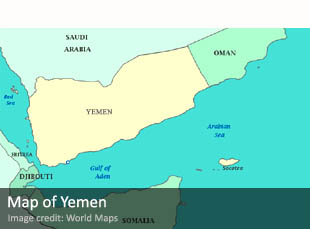Analysis: Why were Western diplomats evacuated from Yemen?
August 8, 2013 4 Comments
 By J. FITSANAKIS and I. ALLEN | intelNews.org |
By J. FITSANAKIS and I. ALLEN | intelNews.org |
American and British embassies in Yemeni capital Sana’a were evacuated on Tuesday, soon after the United States closed 19 of its diplomatic representations in the Middle East and North Africa due to fears of a pending terrorist attack. But why exactly did the evacuations of diplomatic personnel take place in Sana’a? The Yemeni government announced on Wednesday that it had foiled a large-scale attack by al-Qaeda in the Arabian Peninsula (AQAP), which allegedly aimed to cripple the country’s frail economy. According to Yemeni government spokesperson Rajeh Badi, the attack was planned to take place in the country’s central Hadramout governorate, which includes the port cities of al-Mukkala and Ghail Ba Wazir. The Yemeni government said the AQAP forces planned to blow up several oil pipelines before proceeding to occupy the two port cities, from which the majority of Yemen’s oil exports are shipped. Badi added that AQAP planned to take several foreign oil workers hostage as part of the military operations.
However, as Foreign Policy magazine’s Dana Stuster points out, Mohammed Albasha, spokesman of the Yemeni embassy in Washington, DC, seems to dispute his own government’s claims. Early on Wednesday, Albasha tweeted that, in his view, “AQAP doesn’t have the man power nor the capabilities to capture a city the size of Mukkala in Hadramout”, let alone Ghail Ba Wazir. Stuster adds that many Yemen observers agree. It is true that AQAP did launch major military offensives against several Yemeni towns in 2011 and 2012, during the Arab Spring, which had forced the Yemeni military to focus on riots and demonstrations in the big cities. But the move was a tactical disaster for AQAP, both militarily and politically. The organization alienated the residents of the cities it occupied, driving many of them to form militias, which eventually teamed up with Yemen’s armed forces and drove AQAP back in to hiding. It stands to logic that, if AQAP forces were unable to hold Yemeni towns back in 2011 and 2012, when the organization was stronger and the Yemeni military weaker, such a tactical goal would be even more difficult today.
Stuster notes that The New York Times’ explanation of Wednesday’s diplomatic evacuations is a little more measured and therefore plausible. The paper suggested that the goal of AQAP’s alleged operation, which alarmed US intelligence agencies, was not to occupy entire cities, but to attack Western-operated oil installations in al-Mukkala. On the other hand, anyone who has been paying even remote attention to Yemen in the past few years knows that oil installations in the country get attacked on a weekly basis; so there would be nothing necessarily unusual in such an eventuality.
For now, British and American intelligence agencies are staying silent about the reasons that led them to evacuate their diplomats from Yemen. In our view, it would be best for pundits to do the same. It will take quite some time, and concrete evidence, before we can safely conclude whether the Yemen evacuations stemmed from actionable intelligence, or, in the words of former CIA operations officer Sam Faddis, on information that is too broad to lend credibility to America’s security posture.







i’m thinkin’ this would have been another Benghazi operation, put on by the A/Q. a ruse, then a full frontal on a embassy compound.
Perhaps this explains it:
The circumstances in which the spokesman of the Yemeni embassy in Washington, actually Tweets about a sensitive terrorism issue taking place in his country certainly raises doubts about Yemen’s foreign policy efficiency…
While Yemeni terrorism is now officially open ground for US pundit commentary I think I’d trust US intelligence caution over Yemeni Tweets any day.
@Anonymous
Your video might appear simplistic but does tell some home truths about attempts to apply a military capability to a counter-terrorist mission. After the major embarrassment of 9/11 to the broad US security system that system had to plausibly react – most obviously through the military but also through US intelligence efforts on a massive scale.
Hence invasions of Afghanistan (justified terrorism wise) and Iraq (not justified regarding terrorism except as “fly paper”).
However capturing bin Laden was puzzlingly beyond America’s capabilities – or was it? The imprisonment of bin Laden at Abbottabad was a major US and Pakistan intelligence success story – although Obama cannot confirm that aspect http://gentleseas.blogspot.com.au/2012/10/from-2005-us-intel-white-house-kneww.html
Cheers
Pete